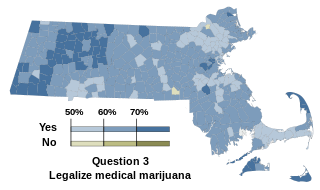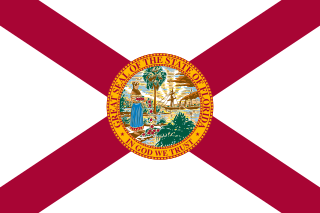In the politics of the United States, the process of initiatives and referendums allow citizens of many U.S. states to place new legislation on a popular ballot, or to place legislation that has recently been passed by a legislature on a ballot for a popular vote. Initiatives and referendums, along with recall elections and popular primary elections, are signature reforms of the Progressive Era; they are written into several state constitutions, particularly in the West.

The Marijuana Policy Project (MPP) is the largest organization working solely on marijuana policy reform in the United States in terms of its budget, number of members, and staff. Its stated aims are to: (1) increase public support for non-punitive, non-coercive marijuana policies; (2) identify and activate supporters of non-punitive, non-coercive marijuana policies; (3) change state laws to reduce or eliminate penalties for the medical and non-medical use of marijuana; and (4) gain influence in Congress. MPP advocates taxing and regulating the possession and sale of marijuana in a manner similar to alcohol, envisions a nation where marijuana education is honest and realistic, and believes treatment for problem marijuana users should be non-coercive and geared toward reducing harm.
The removal of cannabis from Schedule I of the Controlled Substances Act, the most tightly restricted category reserved for drugs that have "no currently accepted medical use," has been proposed repeatedly since 1972.

The Oregon Medical Marijuana Act, a law in the U.S. state of Oregon, was established by Oregon Ballot Measure 67 in 1998, passing with 54.6% support. It modified state law to allow the cultivation, possession, and use of marijuana by doctor recommendation for patients with certain medical conditions. The Act does not affect federal law, which still prohibits the cultivation and possession of marijuana.
Amendment 44 was a proposed amendment to the state statutes submitted for referendum in the 2006 general elections in the U.S. state of Colorado. The amendment proposed the legalization of the possession of one ounce or less of marijuana for any person twenty-one years of age and over, as long as marijuana use does not occur in public. The measure was eventually defeated at the polls by 60-40 percent.
The Michigan Compassionate Care Initiative was an indirect initiated state statute that allowed the medical use of marijuana for seriously ill patients. It was approved by voters as Proposal 1 on November 6, 2008, 63 percent in favor to 37 percent opposed.

Cannabis in Oregon relates to a number of legislative, legal, and cultural events surrounding use of cannabis. Oregon was the first U.S. state to decriminalize the possession of small amounts of cannabis, and among the first to authorize its use for medical purposes. An attempt to recriminalize possession of small amounts of cannabis was turned down by Oregon voters in 1997.

In the United States, the use of cannabis for medical purposes is legal in 33 states, four permanently inhabited U.S. territories, and the District of Columbia, as of January 2019. Fourteen other states have more restrictive laws limiting THC content, for the purpose of allowing access to products that are rich in cannabidiol (CBD), a non-psychoactive component of cannabis. There is considerable variation in medical cannabis laws from state to state, including how it is produced and distributed, how it can be consumed, and what medical conditions it can be used for.
Initiative 1068 was a proposed initiative for the November 2010 Washington state general election that would have removed criminal penalties from the adult use, possession, and cultivation of marijuana in Washington. Sponsored by Vivian McPeak, Douglass Hiatt, Jeffrey Steinborn, Philip Dawdy, initiative I-1068 sought to legalize marijuana by removing marijuana offenses from the state's controlled substances act, but failed to gather enough signatures to qualify for the ballot.

Oregon Ballot Measure 80, also known as the Oregon Cannabis Tax Act, OCTA and Initiative-9, was an initiated state statute ballot measure on the November 6, 2012 general election ballot in Oregon. It would have allowed personal marijuana and hemp cultivation or use without a license and created a commission to regulate the sale of commercial marijuana. The act would also have set aside two percent of profits from cannabis sales to promote industrial hemp, biodiesel, fiber, protein and oil.

Three citizen-initiated measures were voted upon in the 2012 Massachusetts general election: a Right to Repair initiave, a proposal to allow physician-assisted suicide, and a measure to legalize medical marijuana. The Right to Repair initiative, which was to require open access to vehicle diagnostic and repair information, passed overwhelmingly, with 86% support. The measure to allow physician-assisted suicide failed by a narrow margin, with 51% opposed. The proposal to legalize medical marijuana passed with 63% of voter support.

The Massachusetts Medical Marijuana Initiative, appeared as the third question on the state's 2012 ballot as an indirect initiated state statute. The measure allows cannabis to be used for medical purposes in the state. The initiative—backed by the American Civil Liberties Union, the Massachusetts Patient Advocacy Alliance, and the Committee for Compassionate Medicine—was filed with proponents turning in the required signatures to the Massachusetts Attorney General's office by the August 3, 2011 deadline. Those signatures were needed for the required ten qualified voters who submitted the original petition to put forward the full text of the law they want enacted. The initiative passed with support from 63% of state voters.

The legal history of cannabis in the United States began with state-level prohibition in the early 20th century, with the first major federal limitations occurring in 1937. Starting with Oregon in 1973, individual states began to liberalize cannabis laws through decriminalization. In 1996, California became the first state to legalize medical cannabis, sparking a trend that spread to a majority of states by 2016. In 2012, Colorado and Washington became the first states to legalize cannabis for recreational use.
Cannabis in South Dakota is illegal for all purposes, and possession of small amounts is a misdemeanor crime. South Dakota is the only U.S. state which outlaws ingestion of controlled substances. Testing positive for cannabis can be a felony offense.
The Florida Medical Marijuana Legalization Initiative, also known as Amendment 2, was approved by voters in the Tuesday, November 8, 2016, general election in the State of Florida. The bill required a super-majority vote to pass, with at least 60% of voters voting for support of a state constitutional amendment. Florida already had a medical marijuana law in place, but only for those who are terminally ill and with less than a year left to live. The goal of Amendment 2 is to alleviate those suffering from these medical conditions: cancer, epilepsy, glaucoma, positive status for human immunodeficiency virus (HIV), acquired immune deficiency syndrome (AIDS), post-traumatic stress disorder (PTSD), amyotrophic lateral sclerosis (ALS), Crohn's disease, Parkinson's disease, multiple sclerosis, chronic nonmalignant pain caused by a qualifying medical condition or that originates from a qualified medical condition or other debilitating medical conditions comparable to those listed. Under Amendment 2, the medical marijuana will be given to the patient if the physician believes that the medical use of marijuana would likely outweigh the potential health risks for a patient. Smoking the medication was not allowed under a statute passed by the Florida State Legislature, however this ban was struck down by Leon County Circuit Court Judge Karen Gievers on May 25, 2018.
The Arkansas Medical Cannabis Act (AMCA) is a proposed legislative act to appear on the 2016 general election ballot as an initiative in the U.S. state of Arkansas. According to a 2015 survey, 84% of Arkansas voters favored medical cannabis legalization, leading some to conclude passage of the 2016 act is likely. The act has a provision to collect sales tax and apportions some of the revenue to subsidize low-income medical cannabis patients.
Cannabis in Missouri is illegal but decriminalized. Medical use was legalized in 2018 through a ballot initiative to amend the state constitution.
Cannabis in Michigan is legal for medical use and recreational use, after passing a ballot initiative in 2018. Regulated stores are expected to open early in 2020.

















